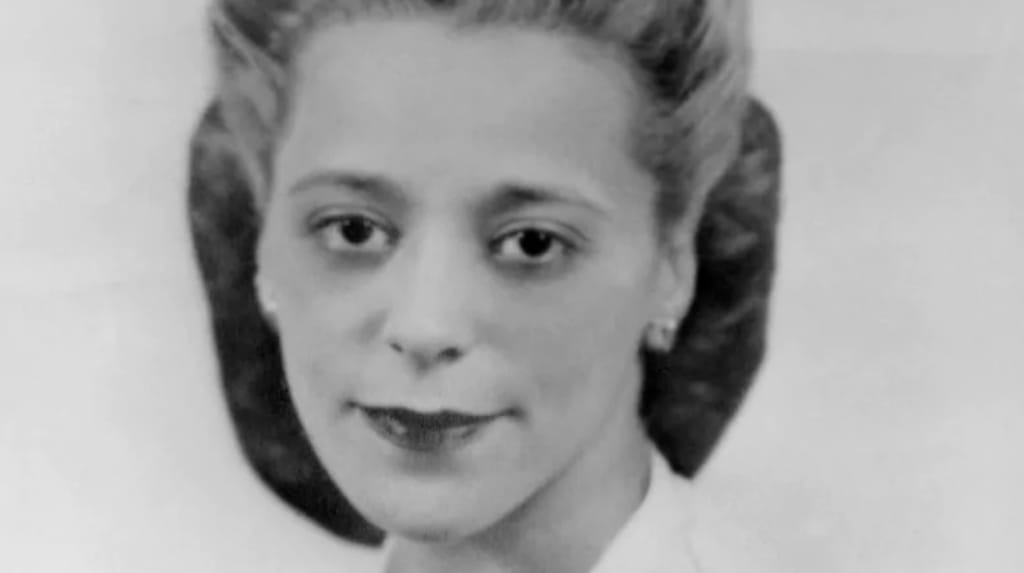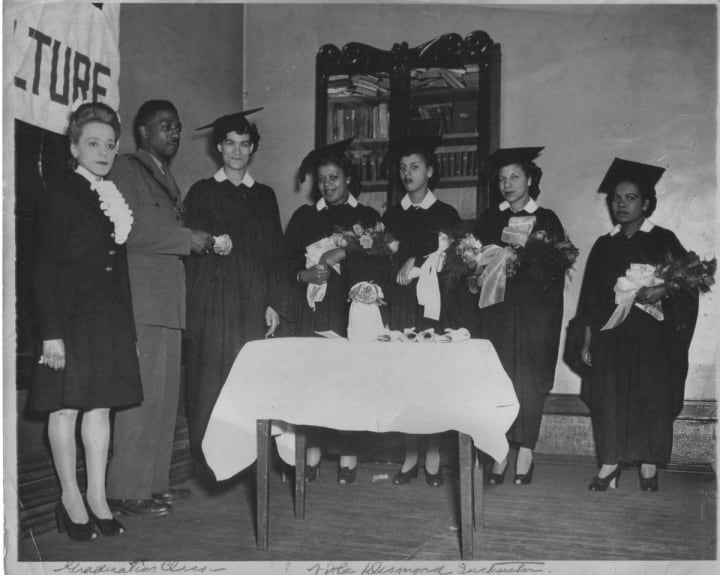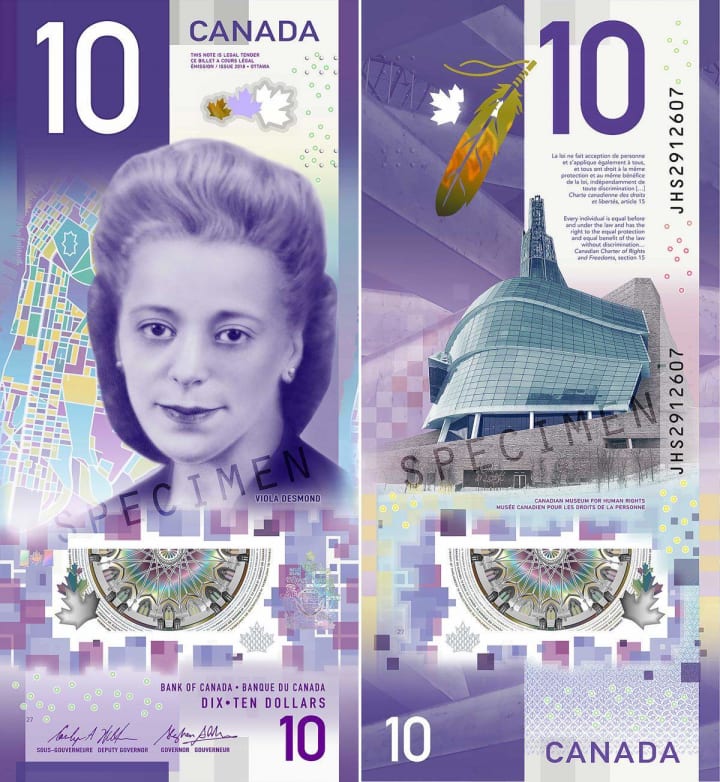Viola Desmond: The Story of "Canada's Rosa Parks" and How I Had No Idea Who She Was Until 2018
Nine years before Rosa Parks became a Civil Rights icon, there was Viola Desmond.

There are certain key historical moments one can point to when discussing the injustices countless faced during the fight for Civil Rights in the early 20th Century. The Tulsa race massacre, Emmett Till's grotesque murder, the Selma to Montgomery marches and Dr. King assassination are a few examples of these pivotal events.
Rosa Parks' defiant stance on-board a segregated bus in Montgomery, Alabama in December 1955 sparked a movement which ultimately led to the Supreme Court ordering Montgomery to integrate its bus system, allowing human beings to sit wherever the hell they wanted on public transit. Parks' bravery has become universally known when discussing the Civil Rights movement in the United States. During my high school days in Toronto, Ontario, when we discussed major racially-charged events throughout history Parks' name was rightfully mentioned alongside other key Civil Rights activists.
There was one particular name and event that occurred here in Canada, however, that I was never taught. I'd venture to guess that many are unfamiliar with the story of Viola Desmond.
With the month of March being Women’s History Month, Vocal issued a writing challenge aptly titled "Women Who Inspire." I figure this to be the perfect opportunity to shed some light on this Canadian Civil Rights activist.
What Happened on the Night of November 1946
Viola Desmond was an entrepreneur during the late 1930s, finding success in the development and expansion of special products/maintenance aimed at the growing trend of new hairstyles. Her and her husband Jack ran a combined barbershop and hairdressing salon on Gottingen St. in Halifax, Nova Scotia.
She became a mentor to aspiring young Black women, opening a beauty school called the Desmond School of Beauty Culture and expanded her business across the province of Nova Scotia. She created a line of beauty products which were sold at venues owned by graduates of her school.

On November 8th 1946 while on a business trip driving to Sydney, Nova Scotia, Desmond's car broke down in New Glasgow which is about a two hour drive to Sydney. She decided to spend the night in the small town and went to the local Roseland Theatre to watch the Olivia de Havilland thriller The Dark Mirror.
While purchasing a ticket for the film, Desmond "requested a ticket for a seat on the main floor. The ticket seller handed Desmond a ticket to the balcony instead" as the balcony section was "the seating generally reserved for non-White customers." When she made her way to the main floor to watch the film she paid for, the ticket seller followed her to her seat stating the ticket was for upstairs seating.
"Thinking that a mistake had been made, Desmond returned to the cashier and asked to exchange the ticket for one downstairs [where the main floor was.]" The cashier looked at her and uttered the following:
“I’m sorry but I’m not permitted to sell downstairs tickets to you people.”
Desmond realized this wasn't an honest mistake, it was racial, and so she decided to sit in her rightful place on the main floor anyway. Theatre manager Henry MacNeil confronted her at her seat arguing that the theatre had the right to "refuse admission to any objectionable person."
"Desmond pointed out that she had not been refused admission and had in fact been sold the ticket, which she still held in her hand. She added that she had attempted to exchange it for a main floor ticket and was willing to pay the difference in cost but had been refused. When she declined to leave her seat, a police officer was called. Desmond was dragged out of the theatre, injuring her hip and knee in the process, and taken to jail."
"Shocked and frightened, she maintained her composure and, as she later explained, sat bolt upright all night long."
She was eventually convicted for an obscure tax offence as a result which was the failure to pay the extra penny in theatre tax required for the lower-level seat. It was a bogus charge and many attempted to get the conviction overturned.
The exhausted efforts taken by the Nova Scotian Black community to assist in her appeal were ultimately unsuccessful. Viola Desmond was unable to remove the charges against her and went unpardoned in her lifetime.
That is, until six decades later.
The First Ever Pardon Granted in Canada
The Honourable Mayann Francis, former Lieutenant Governor of Nova Scotia, stated the following regarding racism found in Canada during Desmond's time:
"The racism in the United States was truly in your face. In Canada, the racism was very polite - sort of undercover."
Unlike the Jim Crow laws that plagued the States, there was no law specifically enforcing segregation in theatres. Despite this, the essentially unspoken nature of racism in Canadian society was difficult to navigate as "Black persons in Canada—and certainly in Nova Scotia—were aware that an unwritten code constrained their lives. Sometimes the limits were difficult to foresee."
On April 15th 2010, the Nova Scotian government spearheaded by Premier Darrell Dexter issued a long-awaited apology to the late Viola Desmond, her family and to all Black Nova Scotians for the heinous racism they experienced.
Following the apology, the Hon. Mayann Francis (who was also the first Black Nova Scotian to serve as Lieutenant Governor) granted a free pardon to Desmond 64 years following her unjust arrest. The Viola Desmond pardon "marked the first time in Canada such a form of clemency has been posthumously awarded."
Desmond's sister Wanda Robson was present during the respective ceremony and stated she was "numb with joy" at the prospect of her sister receiving what she deserved.
Becoming the New Face of the $10 Bill

For those unfamiliar with Canadian currency, our current array of banknotes are made of polymer for heightened security features and durability when you forget to take the $20 bill out of your pocket after already putting it in the wash.
Our $10 banknote featured the face of our first Prime Minister Sir John A. Macdonald from the 1970s to 2018.
In November 2018, Viola Desmond became the first Canadian woman to be featured on a regularly circulating banknote.
Upon seeing her sister appear on the new $10 note, through tears in her eyes Desmond's sister Wanda shared: "it's beautiful... Look at her. Just the way she was... It's as if she's in this room. With this new $10 bill, Canadians will be reminded how Viola stood up for her rights."
Wanda was given the honour of being the first person to make a purchase utilizing the new banknote and decided on buying a book co-written by her and Cape Breton University professor Graham Reynolds about Desmond’s life and legacy. She revealed planning on gifting it to her 12-year-old granddaughter so she could learn more about her great-aunt’s story.
She went on to state how much the banknote is a "giant step forward into [the] knowledge about who we are, where we’ve been, and where we’re going" acknowledging that there is still "a lot of work to be done... I really hope that this bill will get not only children, but adults, to say, ‘who is that?’ And then people will be able to pass on what Viola did and the amazing differences she made.”
I certainly cannot agree with this sentiment more.
The impact of leading activists championing for Civil Rights, particularly female activists, cannot be overstated. Names like Rosa Parks and Viola Desmond deserve to be at the forefront of this discourse as their heroism was undeniably a terrifying experience. Not only were they women attempting to defy the authority held by the male-centric society surrounding them, they were Black women - A minority group that has historically been proven to have received the short end of the stick time and time again.
Learning about Mrs. Desmond is an absolute privilege that I hope is being implemented into future educational curriculum. Besides her invaluable activism; the success she earned as a Black businesswoman, the countless young women she mentored who took her teachings and support to create their own respective successes is an unbelievable inspiration for future generations.
Mrs. Desmond passed away on February 7th 1965 at the age of 50 after settling in New York City.
In April 2019, the Viola Desmond banknote beat out 15 other banknotes to win the International Bank Note Society award and be named the world's best new banknote. Her legacy continues with a myriad of deserved accolades including a star on Canada's Walk of Fame, a harbour ferry in Halifax named after her and a play by playwright Andrea Scott entitled Controlled Damage exploring her life alongside the historical issues of racial discrimination faced in Canada premiered in February 2020.
In the touching words of Wanda Robson on her pioneering and beloved sister: "one woman's actions can really make a difference."
About the Creator
Ghezal Amiri
Afghan-Canadian writer who enjoys witty quips and BTS, proper grammar and Jodie Comer.
I tweet with @MrsBananaPhone because it's the best and beats the rest.
I also have designs: https://www.teepublic.com/user/designingsimple






Comments
There are no comments for this story
Be the first to respond and start the conversation.